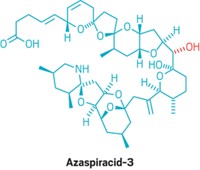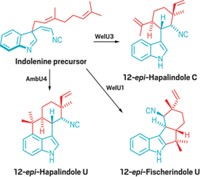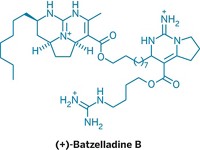Advertisement
Grab your lab coat. Let's get started
Welcome!
Welcome!
Create an account below to get 6 C&EN articles per month, receive newsletters and more - all free.
It seems this is your first time logging in online. Please enter the following information to continue.
As an ACS member you automatically get access to this site. All we need is few more details to create your reading experience.
Not you? Sign in with a different account.
Not you? Sign in with a different account.
ERROR 1
ERROR 1
ERROR 2
ERROR 2
ERROR 2
ERROR 2
ERROR 2
Password and Confirm password must match.
If you have an ACS member number, please enter it here so we can link this account to your membership. (optional)
ERROR 2
ACS values your privacy. By submitting your information, you are gaining access to C&EN and subscribing to our weekly newsletter. We use the information you provide to make your reading experience better, and we will never sell your data to third party members.
Synthesis
Alkaloid Acetylaranotin Made After 40-Year Quest
Organic Chemistry: Caltech chemists make fungal natural product with rhodium catalysis, elemental sulfur
by Carmen Drahl
November 1, 2011
Elemental sulfur has helped bring an end to chemists’ 40-year quest to synthesize (–)-acetylaranotin, an intricately structured alkaloid first isolated from fungi (J. Am. Chem. Soc., DOI: 10.1021/ja209354e). The synthesis could help scientists get more details about how acetylaranotin and its relatives exhibit their anticancer and antiviral activities.
Acetylaranotin is a dimeric epidithiodiketopiperazine natural product. Although chemists have synthesized some natural products in this family, acetylaranotin and molecules most closely resembling it have eluded synthesis. Caltech’s Sarah E. Reisman zeroed in on acetylaranotin’s seven-membered dihydrooxepine ring because its sensitivity to multiple reaction conditions foiled prior synthesis attempts. With graduate student Julian A. Codelli and postdoc Angela L. A. Puchlopek, Reisman generated the ring through a rhodium-catalyzed cycloisomerization followed by chloride elimination. Taking a page from a 2011 synthesis by K. C. Nicolaou’s Scripps Research Institute team (J. Am. Chem. Soc., DOI: 10.1021/ja2032635), Reisman tweaked a 1970s-era protocol to install acetylaranotin’s epidisulfide moiety with elemental sulfur.
“Reisman and her lab knocked this one out of the park,” says Robert M. Williams of Colorado State University, who has worked toward related molecules. Williams adds that the complete retention of stereochemistry the team observed during the epidisulfide installation was “stunning.”
“Our plan right now is to dive in and figure out what’s responsible for that stereoselectivity,” Reisman says.






Join the conversation
Contact the reporter
Submit a Letter to the Editor for publication
Engage with us on Twitter